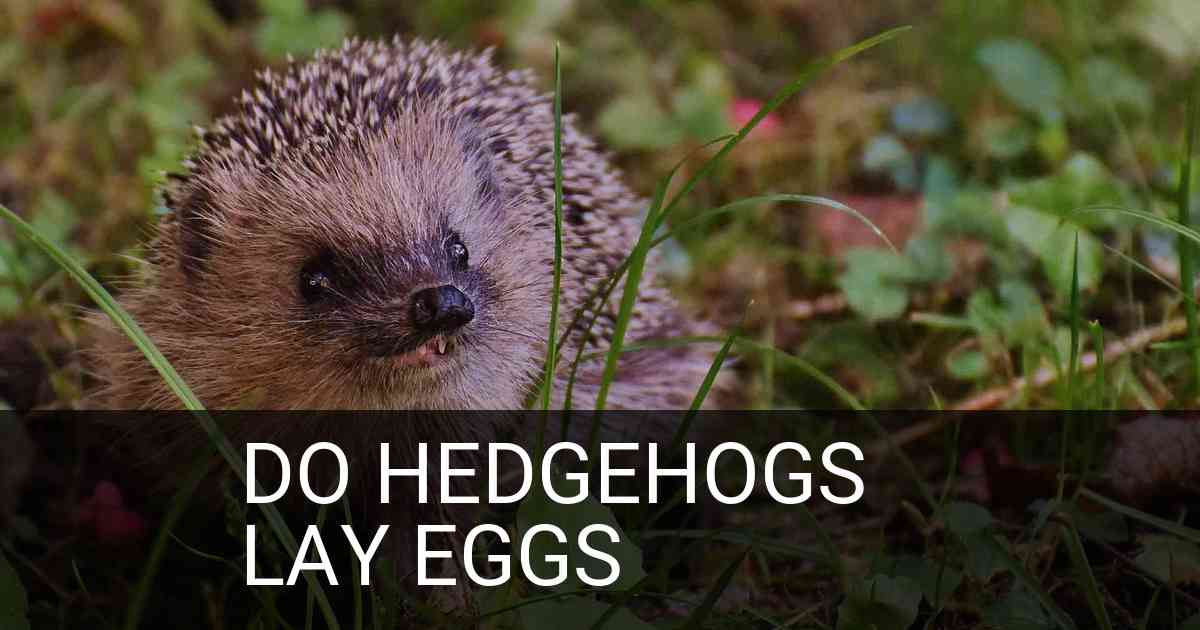
Hedgehogs are adorable creatures that have become increasingly popular as pets in recent years. But do these spiny mammals lay eggs? This is a question many people have about hedgehogs, and the answer may surprise you. In this article, we’ll explore the reproductive habits of hedgehogs to determine if they lay eggs, as well as other interesting facts about their reproduction. So read on to learn more about whether or not hedgehogs lay eggs!
Do Hedgehogs Lay Eggs?
No, hedgehogs do not lay eggs. They are mammals, and like all other mammals, they give birth to live young rather than laying eggs.
Hedgehog Reproductive Habits
Hedgehogs typically mate during the spring months and can produce two litters of up to 7 babies each year. After mating, the female hedgehog will carry her young for a gestation period of around 35 days before giving birth to a litter of 2-7 baby hoglets. The mother will then nurse and care for the hoglets until they reach maturity at around 8 weeks old.
Interesting Facts About Hedgehog Reproduction:
- Female hedgehogs have four teats located on their underside which is where they feed their young from.
- Male hedgehogs do not interfere in raising or caring for the offspring so once mating has taken place, it is purely down to the mother’s efforts.
- At birth, baby hoglets weigh between 12g – 30g (0.4oz – 1oz), however by 8 weeks old this can be more than doubled as an adult hedgehog typically weighs 500g – 1000g (1lb – 2lbs).
The Birthing Process of a Hedgehog
Hedgehog birthing, or parturition, is the process through which female hedgehogs give birth to their young. This process can be complex and challenging for both mother and offspring, but with proper management and care from an experienced owner, it can go smoothly.
Pregnancy & Gestation Period
The gestation period for hedgehogs typically lasts between 32-35 days. During this time, the mother will need extra food and water as her body prepares to carry the babies until they are ready to be born. Toward the end of pregnancy, she may become more aggressive or irritable as she begins to build her nest in preparation for birthing.
Birthing Process
- Stage 1: Nesting – The female hedgehog usually begins preparing her nest about a week before giving birth. She will gather materials such as leaves and grasses that she can use to create a warm bed for herself and her young.
- Stage 2: Labor Begins – After 24-48 hours of nesting activity, labor will begin. Female hedgehogs will start experiencing contractions that last around 20 minutes each time. Her breathing rate may also increase during this stage.
- Stage 3: Baby Delivery – Once labor has begun, baby delivery may take anywhere from one hour up to several hours depending on the number of babies being born (typically two or three). As each baby is delivered, it should weigh around 15 grams at most.
- Stage 4: Nurturing Babies – Immediately after delivery, the mother hedgehog will clean off the newborns with her tongue in order to stimulate breathing and encourage bonding between them. She should then provide further nurturing by licking them clean again every few hours for up to five days after delivery.
- Stage 5: Weaning Babies – Once the babies reach five weeks old, they will no longer require milk from their mother and can be weaned onto solid food such as mealworms, fruits, vegetables, etc. It is important not to remove them from their mother too early, however, as they still need protection while learning how to fend for themselves.
The Number of Eggs Laid by a Hedgehog
Hedgehogs are small, spiny mammals with short legs and long noses. They lay eggs like other animals, though the number of eggs they lay can vary depending on the species.
How Many Eggs Does a Hedgehog Lay?
Most hedgehog species lay between two and four eggs per clutch. Some African hedgehog species may lay up to six eggs in a single clutch. The gestation period for hedgehogs is typically around 35 days.
Factors Affecting Egg Production
Female hedgehogs may produce more or fewer eggs depending on their age, health, and environment. Younger females tend to produce fewer eggs than older ones because their bodies are still developing and they haven’t reached full reproductive maturity yet.
- Age: Younger female hedgehogs usually produce fewer eggs than older ones.
- Health: A female’s overall health can affect her egg production as well; if she is ill or undernourished, she may not have enough energy or resources to produce many eggs.
- Environment: The temperature and quality of food available in the environment also play a role in how many eggs she lays; if there isn’t enough food or it’s too cold, she won’t be able to support more than a few clutches of eggs.
The Number of Babies a Hedgehog Can Produce
A hedgehog can have anywhere from one to eight babies per litter, depending on the breed and size of the mother. The gestation period for a hedgehog is about 35 days. A female hedgehog will typically give birth to between two and four litters in a single year.
Factors That Affect Litter Size
- Age: Older females tend to produce smaller litters than younger ones.
- Breed: Certain breeds such as African Pygmy Hedgehogs (APH) and Indian Long-Eared Hedgehogs (ILEH) are more likely to have larger litters than other species.
- Size: Larger females tend to produce bigger litters than their smaller counterparts.
“It’s important to remember that there isn’t a set number of babies each time—hedgehog mothers may have more or fewer pups in each litter,” says Dr. Wendy Pugh, DVM, veterinary consultant at the Exotic Animal Hospital in San Francisco.
Conclusion
In conclusion, hedgehogs do not lay eggs. They reproduce through live birth and give birth to between two and eight offspring at once. Although they look like small mammals, hedgehogs are actually classified as insectivores due to their diet of insects and other invertebrates. Hedgehogs make great pets for those looking for a unique animal companion with personality and charm.

